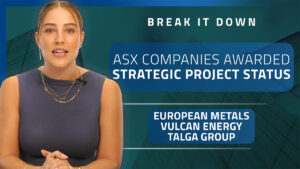Material tracing tech could open up new sectors for ethical investors

The early stages of the supply chain are a key focus for ethical investors, but what about the other end?
Ethical investors have forced companies from Apple to local textile retailer Best & Less to seriously reconsider how they reach their bottom line, as sleuths uncover dangerous workplaces, slave labour, and huge amounts of waste.
That scrutiny is now being focused onto a particular issue: how to create a supply chain that will allow materials to be reused over and over again instead of constantly using ‘new’.
Possibly Australia’s most successful listed ethical investor, Australian Ethical Investment (ASX:AEF), says zero waste is a key consideration.
“The zero-waste hierarchy encourages people to refuse products that we don’t need, reduce what we do need, reuse what we consume, recycle or recover what we cannot reuse, and (ideally) compost the rest,” ethics analyst Amanda Richman told Stockhead.
“We look for companies that are innovating in terms of using post-consumer waste to create new products. Similarly, when we look at retailers we look to see whether they have significant circular economy, recycling or packaging reduction initiatives.”
But transparency at the end of the product life cycle is still lacking, and is the next step in ethical investing, says Haggai Alon, chief of ASX-listed Security Matters (ASX:SMX).
“The core challenge of climate change and protecting the environment is not about carbon emissions or coal, but about reusing products again so we can reduce the amount of virgin materials we need,” he told Stockhead.
Alon is looking at it from a sustainability point of view, but says the more important aspect is commercial.
“It is uneconomical and inefficient to use new materials in every product you make,” he said.
“If I am a brand and I can reclaim my product through a clean line waste channel, I am much more efficient and I am much more economical.”
Security Matters’ technology is known as “The Intelligence on Things” and allows any solid, liquid or gas to be invisibly and irrevocably ‘marked’ using a chemical-based barcode, and ‘read’ using a unique proprietary reader.
The marker can identify micro-plastics in crops, tag gold as being from a legally mined source which doesn’t use child or slave labour, and even trace food from what the animal has eaten through to the scraps at the end of dinner.
Returns are there from ethical investing
But investors are still led to believe the economies of sustainability are not possible alongside good returns.
A KPMG report in September last year found 57 per cent of investors would trade financial returns for a company that always acted ethically towards customers, employees and the community.
But the myth of high environmental, social, and governance (ESG) scores corresponding with low returns has been proven to be just that — a myth.
Risk and portfolio analytics provider Axioma found in 2018 that companies with better ESG standards beat market benchmarks.
It said a majority of portfolios which included a high number of companies with better ESG scores outperformed benchmarks by between 81 and 243 basis points in the four years to March 2018.
Furthermore, the rise of the millennial investor and their demand for better ESG and rising regulations are likely to drive even greater adherence to an ethical investment framework
Closing the circle
At present, closing the sourcing circle by using recycled materials is not common because finding commercial quantities of good quality materials at the other end of the chain is difficult.
“Right now, recycled materials are often not the right quality or too expensive. But those factors will change because the price of virgin materials will go up, the regulation of virgin materials will be harder, and both customer and corporate demand will change,” Alon says.
If a product can be traced from source to rubbish dump, as Security Matters’ technology can do, the burden of regulation will shift from how raw materials are produced to products and companies themselves, he says.
Even Australian Ethical is still investing at the front end of the cycle.
Richman says the fund is ‘overweight’ in industries such as renewable energy, healthcare, real estate and IT, and ‘underweight’ in industries such as traditional energy, minerals extraction, and consumer discretionary.
Things are getting circular
Individuals in search of a ‘circular’ lifestyle tend to go off-grid, but the world as a whole can’t hide itself away like that.
Designing out waste will require new technologies to encourage changes in attitude and corporate practices.
In Australia outside the traditional recycling sector — still struggling after China closed its doors to international trash in 2018 — things are still small scale.
Hazer (ASX:HZR) is using biogas to make hydrogen and graphite, Woolworths (ASX:WOW) has a program to turn out-of-date food into animal feed, while ASPIRE an online –marketplace which matches businesses with remanufacturers, purchasers and recyclers of waste materials — says it’s saved companies about $200,000 in costs associated with waste removal, and prevented 45,000 tonnes of rubbish from entering landfill.
Security Matters is hoping to connect them all, by offering technology that those companies can use to tag and trace the materials that go into those products, and thereby close the loop on the supply chain.
At Stockhead, we tell it like it is. While Security Matters is a Stockhead advertiser, it did not sponsor this article.
Related Topics
UNLOCK INSIGHTS
Discover the untold stories of emerging ASX stocks.
Daily news and expert analysis, it's free to subscribe.
By proceeding, you confirm you understand that we handle personal information in accordance with our Privacy Policy.








